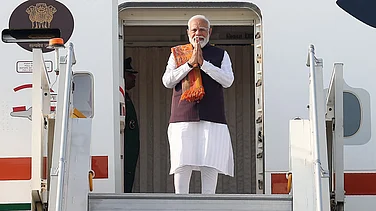Russian cruise missiles struck villages around southern Ukraine's port city of Odesa early Tuesday, hitting houses, a school and a community centre as Russian President Vladimir Putin was in Iran to discuss a UN-backed proposal to unblock exports of Ukrainian grain.
Russian forces fired seven Kalibr cruise missiles at the Odesa region. The Russian Defence Ministry said strikes on the village of Bilenke had a legitimate military goal and "destroyed depots of ammunition for weapons supplied by the United States and European countries."
A local official disputed Moscow's claim and said six people were wounded. "These strikes on peaceful people have one goal - to intimidate the population and the authorities and keep them in constant tension," Serhiy Bratchuk, the speaker of the Odesa regional government, told Ukrainian television.
The Russian military in recent weeks has targeted Odesa and parts of southern Ukraine where its troops captured cities earlier in the war amid indications that Ukraine was planning counterattacks to retake Russian-occupied areas.
Meanwhile, Ukrainian forces on the ground in eastern Ukraine are fighting to hold onto the declining territory under their control. At least two civilians were killed and 15 more were wounded by Russian shelling across the country over the past 24 hours, Ukraine's presidential office said in a morning update.
"There remains a high level of threat of missile strikes throughout the territory of Ukraine," said Oleksandr Shtupun, spokesman of the General Staff of the Ukrainian armed forces.
In eastern Ukraine's Donetsk province, which has been cut off from gas supplies and in part from water and power, one person was killed and two more wounded. "The infrastructure of the cities is being methodically destroyed by missile strikes, and the civilian population, cut off from bare necessities, suffers the most,” Donetsk Gov. Pavlo Kyrylenko said in televised remarks.
Kyrylenko said four Russian strikes were carried out on the city of Kramatorsk. He urged civilians to evacuate. Some residents heeded the warning and loaded what belongings they could carry into a bus early Tuesday to await evacuation.
The missile strikes came as the British military said it believes Russia is facing “increasingly acute” problems in keeping up its troop strength in its grinding war of attrition that began with the Feb. 24 invasion of Ukraine.
The British Defence Ministry in a Tuesday morning assessment said that Russia “has struggled to sustain effective offensive combat power since the start of the invasion, and this problem is likely becoming increasingly acute” as Moscow seeks to conquer the Donbas region of eastern Ukraine.
The British military added: “While Russia may still make further territorial gains, their operational tempo and rate of advance is likely to be very slow without a significant operational pause for reorganization and refit.”
In other developments Tuesday: Ukraine's parliament approved President Volodymyr Zelenskyy's decision to dismiss Ivan Bakanov as head of the country's Security Service, the SBU.
Zelenskyy over the weekend removed Bakanov, as well as Iryna Venediktova, who served as Ukraine's Prosecutor General, over the weekend. The parliament separately voted to approve Venediktova's ouster. As part of the reshuffle, Zelenskyy on Tuesday also fired heads of five regional branches of the SBU and one deputy head of the agency.
Ukraine's first lady, Olena Zelenska, visited Washington at the invitation of the US first lady Jill Biden. Zelenska met Monday with Secretary of State Antony Blinken. US State Department spokesman Ned Price said Blinken assured her of the United States' commitment to Ukraine, and commended her for her work with civilians dealing with trauma and other damage from the war. Zelenska is expected to meet with Jill Biden on Tuesday.





















